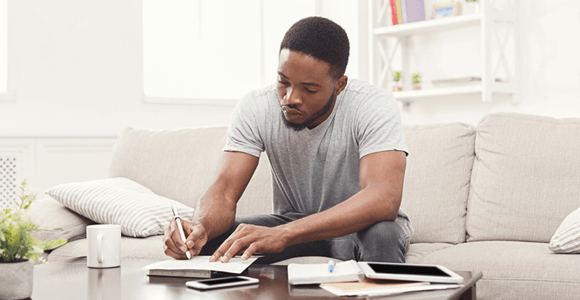Mortgages: Getting Prepared
We will now move on to the part 2 of the Beagle Street Home Buyers’ Guide, which goes through how to prepare and apply for your mortgage and is split into two pages:
1. Getting Prepared
This goes through the documents you’ll need to prepare for a smooth application, including:
- Passport or driving licence
- Pay slips and P60
- Utility bills
- Bank, credit card and savings statements
- Gift letter
- Any self-employed accounts
- Evidence of any benefits received
It also explains the importance of a credit rating and how you can check yours.
2. Applying for a Mortgage
We’ve put together an overview on the next page of how to make the application itself, with comparisons between:
- Applying by yourself
- Using a mortgage adviser/broker:
- Types of brokers
- Pros and cons
- Costs
It also gives information on the ‘Mortgage in Principle’ and how to get yours.
Mortgage Preparation
So, you’ve decided to buy, sourced a deposit, prepared for additional purchase costs and chosen whether or not to use a government scheme to help them onto the housing ladder.
Preparing documents
They say that buying your first home is one of the most stressful times in your life. No matter how well you plan, delays are inevitable: your solicitor may be on holiday, the seller may up the price, offers may be rejected, there may be problems with the property…
Unfortunately, there’s little you’ll be able to do to prepare for them. However, preparing paperwork in advance could help lower stress levels. Luckily, we’ve put together a list of all the documents you’ll need to have ready to send across, below:
Note: if you are buying with someone else, both of you need to present this documentation
Passport copies
- Make sure it’s renewed if it’s close to expiring and you have copies to send across.
Driving licence copies
- Make sure it’s renewed if it’s close to expiring and you have copies to send.
Utility bills
- Having your name on at least one utility bill is really helpful when submitting a mortgage application.
- Mobile phone bills do not count: you’ll need to have something from a supplier such as a gas, electricity or water bill.
- Your bill must be dated within the last 3 months.
Pay slips
- Make sure you are safely filing away your payslips to save yourself the hassle later.
- Generally, you’ll need the last 3 months of payslips and a P60.
Proof of deposit
- Ever throw away your statements? Again, don’t! You’ll probably start noticing a similar theme here, but filing is going to become your friend.
- If you use online banking, print outs may not always be acceptable to your mortgage provider and you may have to request printed statements from your bank, which could take time so it’s good to be prepared with these.
- Whether your deposit is coming from your bank account, savings account, shares or an ISA, it all needs to be documented and proved to a lender. Where available, you’ll need to send across the last 3 months of statements.
Bank statements
- Yet again, you’ll need to show all outgoings and be able to prove that your salary is regularly coming into your bank account.
- Once more, you need 3 months-worth of statements.
Gift letter
- If you’ve been given some money from a friend or family member to put towards a deposit, you might need to prove this with a gift letter and sometimes bank statements to prove that this money is your and not a loan.
- Each lender may request a different template, so make sure you check
Credit card statements
- In most cases you’ll need to provide credit card statements from the last 3 months.
- Having a balance to pay might affect your application. Wherever possible, try to get this to £0 and keep it at £0.
If you pay your credit card off monthly, be careful. Even though you have paid off your bill, some lenders may want to see the evidence of your credit card statement showing a £0 balance. This means you may have to wait for your statement.
Credit checks
Ok – you’ve built up your deposit. You’ve prepared all your documentation. You’re ready to get the best rates, right?
Unfortunately, it’s not as easy as that. Credit rating is essential for getting the best deal possible [1].
There are credit rating companies where you can check your score yourself. Make sure you also check out this helpful article on Money Saving Expert which could help you evaluate your options.
Ideally, you want to get yourself into the ‘Excellent’ category before approaching a lender. This might be tricky – the smallest things like not being on the electoral roll or discrepancies on using your middle name could have an impact. Luckily, all these are amendable, meaning your score can be improved in a matter of weeks, sometimes even days.
Next Steps
You’re nearly there! Now you know what you need to have in place to maximise your chances of getting a mortgage application accepted, the next chapter runs through how to physically make the application.
Appendix
- Which? – Applying for a mortgage
Additional Sources
- The Money Advice Service – How to apply for a mortgage
- Money Saving Expert – How to check your credit score


